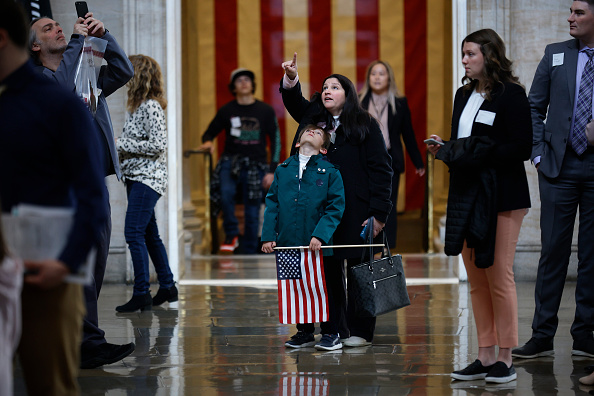After two years of the coronavirus pandemic lockdown, Congress has begun a phased reopening of the U.S. Capitol to the public.
The cap on the number of visitors on official tours was raised from nine to 15. Tours led by lawmakers, or their aides have resumed, as well as student tours led by Capitol guides. The Capitol Visitor Center and restaurants and exhibits will open on May 30.
The U.S. Capitol and the Senate Office Buildings have been closed to the public since March 12, 2020.
Sen. Bill Hagerty (R-TN) introduced S.R. 512, which broadens visitor access, in February, and it passed the Senate by unanimous consent in March. Congressional leadership and the U.S. Capitol Police are working on a “phased” reopening of the entire Capitol Building and Dome with limited tours that began on March 28.
First Amendment Petition Right
The First Amendment to the U.S. Constitution prohibits Congress from blocking citizens’ right “to petition the Government for a redress of grievances.”
The U.S. government has violated this fundamental guarantee for more than two years, says Conservative Caucus Executive Director Art Harman.
“It’s been a great disappointment and disturbing, constitutionally that [the government] can just arbitrarily close the congressional offices and building,” said Harman. “If you cannot walk into your [representative’s] office and speak, you’re limiting that [First Amendment] right.”
The National Institute for Lobbying and Ethics, and more than 200 other organizations and individuals, including the U.S. Chamber of Commerce, the Freedom Foundation, the American Business Defense Council, and the U.S. Travel Association requested the Capitol re-open fully by mid-July in a letter to congressional leaders, on March 9.
Shutdown ‘Caused Irreparable Damage’
Congress has gradually restricted constituents’ access to legislators, says Harman.
“I published one of the first-ever lists of public emails for Congress and maintained that until they decided to stop that and went to web forms on their websites,” said Harman said. “Then they further restricted [communication] by requiring a person to enter their zip code.”
Citizens shouldn’t be limited to communicating only with their own congressmen, says Harman.
“Every American should have the ability to contact a member who is not their representative because he or she may sit on a key committee that affects their districts, or they are a key vote that affects every American,” said Harman.
Most concerning, the long shutdown set a precedent for the government to deny Americans access to government buildings and elected officials in the future, says Harman.
“These big-government lockdowns and mandates have caused irreparable damage that will be felt for generations to come,” Hagerty said. “As we move ahead, we must not lose sight of this lesson.”
Ashley Bateman (bateman.ae@googlemail.com) writes from Virginia.
